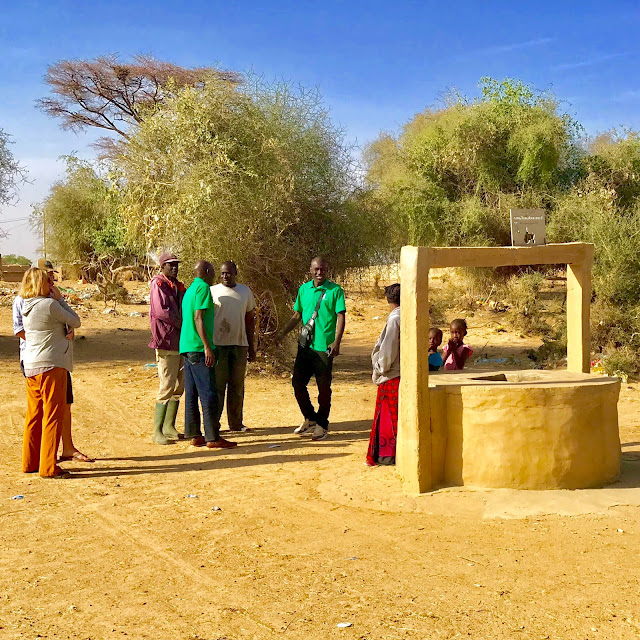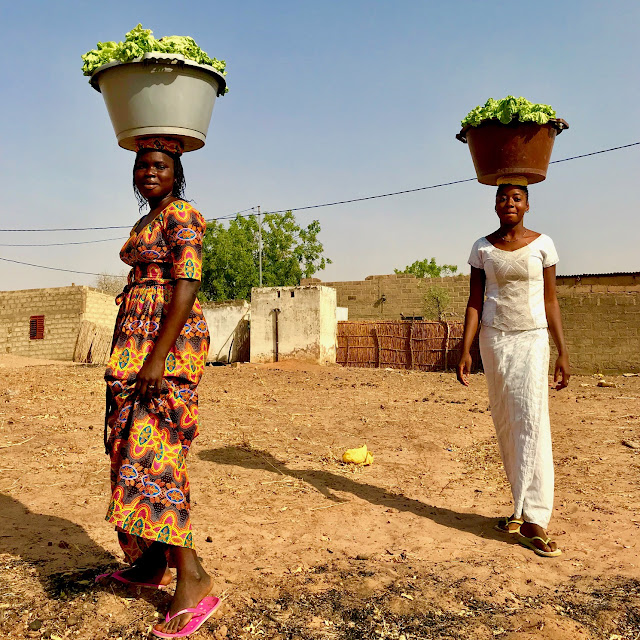We woke up early yesterday and took off on a long journey, driving 450 kilometers from Dakar Senegal to Podor, in the far north. This is an arduous trip, and took seven hours of hard driving. It used to be worse, but the roads have improved considerably. It used to take two days.
The country of Senegal is a place we know well, having been here many times in the last twenty five years. Indeed, we were here in December. We are active with our Andando Foundation, providing development aid to rural areas.
Podor is one of those rather impoverished areas. We are right on the bank of the Senegal River which forms the northern border of Senegal, across from neighboring Mauritania. The river is an anomaly, meaning that is is unusual in such a dry arid country.
As I mentioned, the roads have improved substantially in the last few years. If you want to improve a country, make the roads better. Then people can get around and you can get products to distant markets. It opens up the country, provides better access, and saves a tremendous amount of time getting around.
Part of the long highway we drove on was built with aid from America. I know this because there are many signs on the recent built road that say “Brought to you by the People of America”. Over the years, the USA has helped many countries improve with foreign aid. Sadly, this has diminished rather abruptly in recent years.

In our place, in other words, instead of America providing this aid, it is now the Chinese. They are very active in Africa. We have traveled a lot around this continent, and the Chinese are very aggressive with their foreign aid and investment. They don’t send missionaries, they send money and workers. They build bridges, roads, dams, power plants, and factories.
One difference is that America puts up signs that say “We built this”. China doesn’t put up signs, they are not looking for credit or brownie points. Instead they say “We want your copper (or coal, or oil, minerals, wood, etc)”, fill in the blank, and the Chinese are here to get what they can. This does not downplay their impact, they have done a lot of good things for Africa, a place that needs all the help it can get. But the Chinese get something in return.
A Day In The Life of Andando
Podor (shown in the photo at the top) is an interesting town. It's the northernmost town in Senegal, and there is an old French fort (pictured below) established in 1854 as an outpost for their "colony"
I will recap our day as it unfolded.
We first had breakfast at our hotel, a restored colonial building on the banks of the river. It is a very nice hotel, somewhat impressive really in light of the rough conditions. It's always surprising to see they can pull this off in a remote place. It even has air conditioning.
First we headed to a well dug previously seven years ago. It is still working properly and should continue to do so for another twenty years. One of our first endeavors here was digging wells to provide water to communities or villages that didn't have any access to water. A hand dug well done right will last a very long time. We have seen and used wells here that are up to forty years old.
We arrived next at our new garden here in Diambo Diaobe (pronounced Jambo Jo-bay). This young garden is already producing a large quantity of vegetables and other items. The ladies who work in this garden were happy to see us and started singing and dancing. It's their way to welcome and celebrate at the same time, and it's always fun.
One unique aspect of this well is that it draws water from the nearby Senegal River. This is a first for us, and is made possible by the proximity of the river. Our approach, which has proven very effective, is to use solar power to drive a pump and holding system. There is always ample sunshine in this country - it's hot and sunny all year round. Which also makes gardens grow.
From there we went to a very remote village where we recently completed a Health Post. This place was way out in the puckerbrush, and you need a good off-road four wheel drive rig to get there. It also attracted a crowd of the locals, who were very happy to see us.
We toured the building and had a sit down meeting with a few speeches. This is a typical project for us, to construct a modest Health clinic style building to serve a local population that does not have access to proper medical care. These folks in this village are at least two hours away from a proper "hospital" and in the rainy season, they can't get there at all - isolated by high water when the river floods.
After that we left to visit another project, a new set of classrooms at another local village closer to Podor. This is a common example of a need for the area villages. A growing population needs more space in their schools to educate their children.
This particular school had the best terrible example of temporary classrooms I have ever seen (and we've seen a bunch of bad ones). They built a structure with branches and leaves on a dirt floor and.
We will replace this with three new classrooms built of brick and mortar with a proper tin roof.
The progression sequence of this day was significant because of the pattern of the projects: This represents the progress that Andando has achieved over the years.
- First were hand dug wells providing water. Women no longer had to travel an hour a day to get water and carry it on their head.
- Next were bonafide market gardens utilizing that water to produce nutritious food with enough surplus to sell for income.
- Then Health Posts to enable the villagers to address their medical needs, primary on that list is birthing babies.
- Decent classrooms for the modest schools to educate their growing population.
--------------------------------------
One last event that day gave proof to the needs we are trying to address. After visiting the school later in the day, a local woman came up to us and asked if we could possibly take a local woman to the "hospital" (which is really a glorified clinic, but they best they have anywhere nearby).
The young lady was in labor and having a very rough time. The woman saw our truck and asked if it was possible take her to the medical clinic, like real soon. (the only other option was a brutal hot dusty bumpy trip on the back of a donkey cart).
The mother had already been in labor for many hours and there was concern for her health and that of the baby. We answered "of course", and Fiona set off with our driver, the expectant mother, and two other relatives for the six kilometer trip across the outback.
Later we received the happy news that she had delivered a healthy baby and mother and child were doing fine. Good news!
--------------------------------------
We are proud to play a small part in improving the world around us.














































